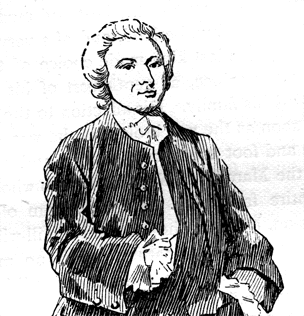
William Widdrington, 4th Baron Widdrington
Encyclopedia

Baron Widdrington
Baron Widdrington, of Blankney in the County of Lincoln, was a title in the Peerage of England. It was created on 2 November 1643 for Sir William Widdrington, 1st Baronet. He had already been created a Baronet, of Widdrington in the County of Northumberland, in the Baronetage of England on 9 July...
of Blankney
Blankney
Blankney is a village and civil parish in the North Kesteven district of Lincolnshire, England, with a population of 239 according to the 2001 census. The village is about south of Lincoln and north of Sleaford...
on the death of his father (William Widdrington, 3rd Baron Widdrington) in 1695.
He was a member of a staunchly Catholic
Roman Catholic Church
The Catholic Church, also known as the Roman Catholic Church, is the world's largest Christian church, with over a billion members. Led by the Pope, it defines its mission as spreading the gospel of Jesus Christ, administering the sacraments and exercising charity...
family, was educated at a Jesuit
Society of Jesus
The Society of Jesus is a Catholic male religious order that follows the teachings of the Catholic Church. The members are called Jesuits, and are also known colloquially as "God's Army" and as "The Company," these being references to founder Ignatius of Loyola's military background and a...
college in Paris
Paris
Paris is the capital and largest city in France, situated on the river Seine, in northern France, at the heart of the Île-de-France region...
and became a supporter of the Stuart
House of Stuart
The House of Stuart is a European royal house. Founded by Robert II of Scotland, the Stewarts first became monarchs of the Kingdom of Scotland during the late 14th century, and subsequently held the position of the Kings of Great Britain and Ireland...
claim to the English Crown.
Political activity
He took part in the Jacobite risingJacobite rising
The Jacobite Risings were a series of uprisings, rebellions, and wars in Great Britain and Ireland occurring between 1688 and 1746. The uprisings were aimed at returning James VII of Scotland and II of England, and later his descendants of the House of Stuart, to the throne after he was deposed by...
of 1715, and with two of his brothers, was taken prisoner after the Battle of Preston
Battle of Preston (1715)
The Battle of Preston , also referred to as the Preston Fight, was fought during the Jacobite Rising of 1715 ....
. He was convicted of high treason
High treason
High treason is criminal disloyalty to one's government. Participating in a war against one's native country, attempting to overthrow its government, spying on its military, its diplomats, or its secret services for a hostile and foreign power, or attempting to kill its head of state are perhaps...
and condemned to death but was reprieved after an intervention by Catherine Graham. Although his title and estates were forfeited, he was not executed but was allowed to retire to Bath.
Family
He married Jane Tempest in 1700 and resided at Stella HallStella park
Stella Park is a housing estate in Blaydon-on-Tyne, Tyne and Wear, England, located on the grounds of a mansion of the same name.-Stella Hall:...
, Blaydon
Blaydon
Blaydon-on-Tyne is a town in the North East of England in the Metropolitan Borough of Gateshead. The former urban district, however, extends much further, its fourteen and a half square miles constituting the largest administrative district, after Newcastle, on Tyneside...
on Tyne, Northumberland
Northumberland
Northumberland is the northernmost ceremonial county and a unitary district in North East England. For Eurostat purposes Northumberland is a NUTS 3 region and is one of three boroughs or unitary districts that comprise the "Northumberland and Tyne and Wear" NUTS 2 region...
. When his son, Henry Francis Widdrington, who claimed the barony, died in September 1774, the family appears to have become extinct.
His wife Jane died in 1714, and in 1718 he married Catherine Graham. In 1739, Catherine and her sister Mary inherited the estate at Nunnington Hall, Yorkshire, from their nephew Charles, third and last Viscount Preston, who died without issue. After his death on 17 April 1743, he was interred in his wife's family vault at Nunnington Parish Church.

